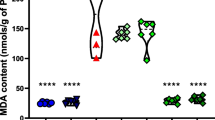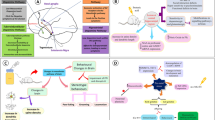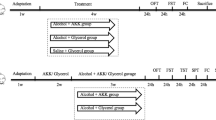Abstract
This study aims to investigate the effect of irisin on ethanol-induced behavioral deficits and explore the underlying mechanisms. A mouse model of ethanol addiction/withdrawal was constructed through chronic ethanol administration. Depressive-like behaviors were evaluated by the tail suspension test and forced swimming test, and anxiety-like behaviors were evaluated by the marble-burying test and elevated plus maze test. The expression of Nrf2 was measured by western blotting. Levels of inflammatory mediators (NF-κB, TNF-α, IL-1β and IL-6) and oxidative stress factors (ROS, MDA, GSH and SOD) were detected by ELISA. The ethanol-induced PC12/BV2 cell injury model was used to elucidate whether the effect of irisin on ethanol-induced neurological injury was related to anti-inflammatory and antioxidant mechanisms. Ethanol-induced ethanol preference and emotional deficits were improved by chronic irisin treatment; however, these improvements were partly reversed by cotreatment with the Nrf2 inhibitor ML385. Further results implied that the improvement effect of irisin on behavioral abnormalities may be related to its anti-inflammatory and antioxidant effects. In detail, irisin inhibited ethanol-induced abnormal expression of ROS and MDA and upregulated the expression of GSH and SOD. Meanwhile, irisin treatment inhibited ethanol-induced overexpression of NF-κB, TNF-α, IL-1β and IL-6 in the hippocampus and cerebral cortex. The regulation of oxidative stress factors by irisin was reversed after ML385 treatment. In the in vitro study, overexpression of oxidative stress factors in ethanol-treated PC12 cells was inhibited by irisin treatment; however, the prevention was reversed after the knockdown of Nrf2 siRNA. Moreover, ethanol-induced overexpression of inflammatory mediators in BV2 cells was also inhibited by irisin treatment. Irisin improved depressive and anxiety-like behaviors induced by ethanol addiction/withdrawal in mice, and this protection was greatly associated with the NF-κB-mediated anti-inflammatory signaling pathway and Nrf2-mediated antioxidative stress signaling pathway.









Similar content being viewed by others
Data availability
Datasets generated during and/or analysed during the current study are available from the corresponding author on reasonable request.
Code availability
Not applicable.
References
Amirshahrokhi K, Niapour A (2022) Methylsulfonylmethane protects against ethanol-induced brain injury in mice through the inhibition of oxidative stress, proinflammatory mediators and apoptotic cell death. Int Immunopharmacol 106:108638. https://doi.org/10.1016/j.intimp.2022.108638
Askari H, Rajani SF, Poorebrahim M et al (2018) A glance at the therapeutic potential of irisin against diseases involving inflammation, oxidative stress, and apoptosis: an introductory review. Pharmacol Res 129:44–55. https://doi.org/10.1016/j.phrs.2018.01.012
Bellezza I, Giambanco I, Minelli A, Donato R (2018) Nrf2-Keap1 signaling in oxidative and reductive stress. Biochim Biophys Acta Mol Cell Res 1865(5):721–733. https://doi.org/10.1016/j.bbamcr.2018.02.010
Bertola A, Mathews S, Ki SH et al (2013) Mouse model of chronic and binge ethanol feeding (the NIAAA model). Nat Protoc 8(3):627–637. https://doi.org/10.1038/nprot.2013.032
Bostrm P, Wu J, Jedrychowski MP et al (2012) A PGC1-α-dependent myokine that drives brown-fat-like development of white fat and thermogenesis. Nature 481(7382):463–8. https://doi.org/10.1038/nature10777
Bruijnzeel AW, Repetto M, Gold MS (2004) Neurobiological mechanisms in addictive and psychiatric disorders. Psychiatr Clin North Am 27(4):661–674. https://doi.org/10.1016/j.psc.2004.06.005
Chastain LG, Sarkar DK (2014) Role of microglia in regulation of ethanol neurotoxic action. Int Rev Neurobiol 118:81–103. https://doi.org/10.1016/B978-0-12-801284-0.00004-X
Chi C, Fu H, Li Y-H et al (2022) Exerkine fibronectin type-III domain-containing protein 5/irisin-enriched extracellular vesicles delay vascular ageing by increasing SIRT6 stability. Eur Heart J. https://doi.org/10.1093/eurheartj/ehac431
Choi ES, Kim MK, Song MK et al (2014) Association between serum irisin levels and non-alcoholic fatty liver disease in health screen examinees. PLoS One 9(10):e110680. https://doi.org/10.1371/journal.pone.0110680
Chopra K, Tiwari V (2012) Alcoholic neuropathy: possible mechanisms and future treatment possibilities. Br J Clin Pharmacol 73(3):348–362. https://doi.org/10.1111/j.1365-2125.2011.04111.x
Coiro V, Casti A, Saccani Jotti G et al (2007) Effects of moderate ethanol drinking on the GH and cortisol responses to physical exercise. Neuroendocrinol Lett 28(2):145–148
Contreras ML, de la Fuente-Ortega E, Vargas-Roberts S et al (2017) NADPH oxidase isoform 2 (NOX2) is involved in drug addiction vulnerability in progeny developmentally exposed to ethanol. Front Neurosci 11:338. https://doi.org/10.3389/fnins.2017.00338
Crews F, Nixon K, Kim D et al (2006) BHT blocks NF-kappaB activation and ethanol-induced brain damage. Alcohol Clin Exp Res 30(11):1938–1949. https://doi.org/10.1111/j.1530-0277.2006.00239.x
Gallego X, Cox RJ, Funk E et al (2015) Voluntary exercise decreases ethanol preference and consumption in C57BL/6 adolescent mice: sex differences and hippocampal BDNF expression. Physiol Behav 138:28–36. https://doi.org/10.1016/j.physbeh.2014.10.008
Ganie SA, Haq E, Hamid A et al (2011) Long dose exposure of hydrogen peroxide (H2O2) in albino rats and effect of Podophyllum hexandrum on oxidative stress. Eur Rev Med Pharmacol Sci 15(8):906–915
Guzman M, Lo Verme J, Fu J et al (2004) J Biol Chem 279:27849–27854. https://doi.org/10.1074/jbc.M404087200
Ji LL, Zhang Y (2014) Antioxidant and anti-inflammatory effects of exercise: role of redox signaling. Free Radic Res 48(1):3–11. https://doi.org/10.3109/10715762.2013.844341
Jiang X, Lin Q, Xu L et al (2020) Indoleamine-2,3-Dioxygenase mediates emotional deficits by the Kynurenine/Tryptophan pathway in the ethanol Addiction/Withdrawal mouse model. Front Cell Neurosci 14:11. https://doi.org/10.3389/fncel.2020.00011
Jiang X, Liu J, Lin Q et al (2017a) Proanthocyanidin prevents lipopolysaccharide-induced depressive-like behavior in mice via neuroinflammatory pathway. Brain Res Bull 135:40–46. https://doi.org/10.1016/j.brainresbull.2017.09.010
Jiang X, Zhu K, Xu Q et al (2017b) The antidepressant-like effect of trans-astaxanthin involves the serotonergic system. Oncotarget 8:25552–25563. https://doi.org/10.18632/oncotarget.16069
Jo D, Song J (2021) Irisin Acts via the PGC-1α and BDNF pathway to improve depression-like behavior. Clin Nutr Res 10(4):292–302. https://doi.org/10.7762/cnr.2021.10.4.292
Kim OY, Song J (2018) The role of Irisin in Alzheimer’s Disease. J Clin Med 7(11):407. https://doi.org/10.3390/jcm7110407
Kumar A, Singh CK, Lavoie HA et al (2011) Resveratrol restores Nrf2 level and prevents ethanol-induced toxic effects in the cerebellum of a rodent model of fetal alcohol spectrum disorders. Mol Pharmacol 80(3):446–457. https://doi.org/10.1124/mol.111.071126
Li K, Yan L, Zhang Y et al (2020a) Seahorse treatment improves depression-like behavior in mice exposed to CUMS through reducing inflammation/oxidants and restoring neurotransmitter and neurotrophin function. J Ethnopharmacol 250:112487. https://doi.org/10.1016/j.jep.2019.112487
Li Y, Chen H, Yang Y et al (2020b) Danshen formula granule and salvianic acid A alleviate ethanol-induced neurotoxicity. J Nat Med 74(2):399–408. https://doi.org/10.1007/s11418-019-01379-4
Li Q, Tan Y, Chen S et al (2021) Irisin alleviates LPS-induced liver injury and inflammation through inhibition of NLRP3 inflammasome and NF-κB signaling. J Recept Signal Transduct Res 41(3):294–303. https://doi.org/10.1080/10799893.2020.1808675
Lourenco MV, Ribeiro FC, Sudo FK et al (2020) Cerebrospinal fluid irisin correlates with amyloid-β, BDNF, and cognition in Alzheimer’s disease. Alzheimers Dement (Amsterdam Netherlands) 12(1):e12034. https://doi.org/10.1002/dad2.12034
Mahalakshmi B, Maurya N, Lee S-D, Bharath Kumar V (2020) Possible neuroprotective mechanisms of physical exercise in neurodegeneration. Int J Mol Sci 21(16):5895. https://doi.org/10.3390/ijms21165895
Maraslioglu M, Weber R, Korff S et al (2013) Activation of NF-κB after chronic ethanol intake and haemorrhagic shock/resuscitation in mice. Br J Pharmacol 170(3):506–518. https://doi.org/10.1111/bph.12224
Mohseni F, Garmabi B, Khaksari M (2021) Apelin-13 attenuates spatial memory impairment by anti-oxidative, anti-apoptosis, and anti-inflammatory mechanism against ethanol neurotoxicity in the neonatal rat hippocampus. Neuropeptides 87:102130. https://doi.org/10.1016/j.npep.2021.102130
Nascimento CP, Luz DA, da Silva CCS et al (2020) Ganoderma lucidum ameliorates neurobehavioral changes and oxidative stress Induced by ethanol binge drinking. Oxidative Med Cell Longev 2020:2497845. https://doi.org/10.1155/2020/2497845
Nkpaa KW, Adedara IA, Amadi BA et al (2019) Ethanol via regulation of NF-κB/p53 signaling pathway increases Manganese-Induced inflammation and apoptosis in hypothalamus of rats. Biol Trace Elem Res 190(1):101–108. https://doi.org/10.1007/s12011-018-1535-3
Noda Y, Kuzuya A, Tanigawa K et al (2018) Fibronectin type III domain-containing protein 5 interacts with APP and decreases amyloid β production in Alzheimer’s disease. Mol Brain 11(1):61. https://doi.org/10.1186/s13041-018-0401-8
Obernier JA, Bouldin TW, Crews FT (2002) Binge ethanol exposure in adult rats causes necrotic cell death. Alcohol Clin Exp Res 26(4):547–557. https://doi.org/10.1111/j.1530-0277.2002.tb02573.x
Orio L, Alen F, Pavón FJ et al (2019) Oleoylethanolamide, Neuroinflammation, and alcohol abuse. Front Mol Neurosci 11:490. https://doi.org/10.3389/fnmol.2018.00490
Paulucio D, Terra A, Santos CG et al (2018) Acute effect of ethanol and taurine on frontal cortex absolute beta power before and after exercise. PLoS One 13(3):e0194264. https://doi.org/10.1371/journal.pone.0194264
Pignataro P, Dicarlo M, Zerlotin R et al (2021) FNDC5/Irisin system in neuroinflammation and neurodegenerative Diseases: Update and Novel Perspective. Int J Mol Sci 22(4):1605. https://doi.org/10.3390/ijms22041605
Qin L, Bouchard R, Pugazhenthi S (2016) Regulation of cyclic AMP response element-binding protein during neuroglial interactions. J Neurochem 136:918–930. https://doi.org/10.1111/jnc.13497
Quintanilla RA, Pérez MJ, Aranguiz A et al (2020) Activation of the Melanocortin-4 receptor prevents oxidative damage and mitochondrial dysfunction in cultured hippocampal neurons exposed to ethanol. Neurotox Res 38(2):421–433. https://doi.org/10.1007/s12640-020-00204-1
Sanchez-Alavez M, Nguyen W, Mori S, Wills DN, Otero D, Ehlers CL, Conti B et al (2019) Time course of microglia activation and brain and blood cytokine/chemokine levels following chronic ethanol exposure and protracted withdrawal in rats. Alcohol 76:37–45. https://doi.org/10.1016/j.alcohol.2018.07.005
Schneider R, Bandiera S, Souza DG et al (2017) N-acetylcysteine prevents Alcohol related neuroinflammation in rats. Neurochem Res 42(8):2135–2141. https://doi.org/10.1007/s11064-017-2218-8
Tajuddin N, Moon K-H, Marshall SA et al (2014) Neuroinflammation and neurodegeneration in adult rat brain from binge ethanol exposure: abrogation by docosahexaenoic acid. PLoS One 9(7):e101223. https://doi.org/10.1371/journal.pone.0101223
Tilg H, Moschen AR, Szabo G (2016) Interleukin-1 and inflammasomes in alcoholic liver disease/acute alcoholic hepatitis and nonalcoholic fatty liver disease/nonalcoholic steatohepatitis. Hepatology (Baltimore MD) 64(3):955–965. https://doi.org/10.1002/hep.28456
Tonelli C, Chio IIC, Tuveson DA (2018) Transcriptional regulation by Nrf2. Antioxid Redox Signal 29(17):1727–1745. https://doi.org/10.1089/ars.2017.7342
Tu W, Wang H, Li S et al (2018) The anti-inflammatory and anti-oxidant mechanisms of the Keap1/Nrf2/ARE signaling pathway in chronic diseases. Aging Dis 10(3):637–651. https://doi.org/10.14336/AD.2018.0513
Waluga M, Kukla M, Kotulski R et al (2019) Omentin, vaspin and irisin in chronic liver diseases. J Physiol Pharmacol: Off J Pol Physiol Soc 70. https://doi.org/10.26402/jpp.2019.2.11
Wang X, Yu H, Wang C et al (2020) Chronic ethanol exposure induces neuroinflammation in H4 cells through TLR3 / NF-κB pathway and anxiety-like behavior in male C57BL/6 mice. Toxicology 446:152625. https://doi.org/10.1016/j.tox.2020.152625
Wu D, Cederbaum AI (2009) Oxidative stress and alcoholic liver disease. Semin Liver Dis 29(2):141–154. https://doi.org/10.1055/s-0029-1214370
Yao H, Zhang D, Yu H et al (2022) AMPAkine CX516 alleviated chronic ethanol exposure-induced neurodegeneration and depressive-like behavior in mice. Toxicol Appl Pharmcol 439:115924. https://doi.org/10.1016/j.taap.2022.115924
Yu X, Jiang X, Zhang X et al (2016) The effects of fisetin on lipopolysaccharide-induced depressive-like behavior in mice. Metab Brain Dis 31(5):1011–1021. https://doi.org/10.1007/s11011-016-9839-5
Yu Y, Li Y, Qi K et al (2022) Rosmarinic acid relieves LPS-induced sickness and depressive-like behaviors in mice by activating the BDNF/Nrf2 signaling and autophagy pathway. Behav Brain Res 433:114006. https://doi.org/10.1016/j.bbr.2022.114006
Zhu D, Wang H, Zhang J et al (2015) Irisin improves endothelial function in type 2 diabetes through reducing oxidative/nitrative stresses. J Mol Cell Cardiol 87:138–47. https://doi.org/10.1016/j.yjmcc.2015.07.015
Acknowledgements
The authors thank Dr Ying Hu, Dean of Pharmacology Department, Manipal Zhejiang Pharmaceutical University, for providing facilities to carry out this project, and Mr Yingzheng Zhao Head of Department of Pharmacy, Wenzhou Medical College, for facilitating the animal experiments and providing necessary support to carry out this project.
Funding
This work was funded by Zhejiang Province Public Welfare Technology Application Research Project of China (LGF18H090014), Public science and technology project of Ningbo (202002N3151) for Xuefeng Yu. The Science and Technology Project of Zhejiang Medical and Health Department (2020KY289), Ningbo Natural Science Foundation (2019A610300), the Science and Technology Project of Ningbo Yinzhou District (2022AS036) for Xi Jiang. The Science and Technology Project of Zhejiang Medical and Health Department (2023KY1254) for Qizhi Yan.
Author information
Authors and Affiliations
Contributions
Conceptualization, Xi Jiang and Xuefeng Yu; Data curation, Qizhi Yan, Qian Lin and Xuefeng Yu; Formal analysis, Xi Jiang, Lei Chen and Jin Chen; Methodology, Qizhi Yan, Wendie Lao and Fuhe Liu; Project administration, Qian Lin and Haoran Cao.
Corresponding authors
Ethics declarations
Ethics approval
This study and included experimental procedures were approved by the institutional animal care and use committee of Wenzhou Medical University (approval no. wydw2021-01913). All animal housing and experiments were conducted in strict accordance with the institutional guidelines for care and use of laboratory animals.
Consent to participate
Not applicable.
Consent for publication
Not applicable.
Conflict of interest
The authors declare no confict of interest associated with this publication.
Additional information
Publisher’s note
Springer Nature remains neutral with regard to jurisdictional claims in published maps and institutional affiliations.
Supplementary information
Below is the link to the electronic supplementary material.
ESM 1
The expression of nuclear Nrf2 in control and siRNA-treated PC12 cells. Values are expressed as the mean ± S.E.M. n = 6. ***p < 0.001 compared with the control group. (JPG 186 KB)
Rights and permissions
Springer Nature or its licensor (e.g. a society or other partner) holds exclusive rights to this article under a publishing agreement with the author(s) or other rightsholder(s); author self-archiving of the accepted manuscript version of this article is solely governed by the terms of such publishing agreement and applicable law.
About this article
Cite this article
Jiang, X., Yan, Q., Lao, W. et al. Irisin attenuates ethanol-induced behavioral deficits in mice through activation of Nrf2 and inhibition of NF-κB pathways. Metab Brain Dis 38, 1643–1656 (2023). https://doi.org/10.1007/s11011-023-01202-w
Received:
Accepted:
Published:
Issue Date:
DOI: https://doi.org/10.1007/s11011-023-01202-w




